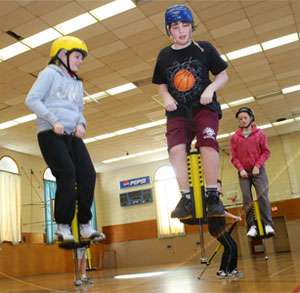 |
| Kids between the ages of 10 to 13 were recruited to take part in pogo fitness sessions. (Nick Pearce Photo) |
µţ´Çľ±˛Ô˛µâ€¦b´Çľ±˛Ô˛µâ€¦b´Çľ±˛Ô˛µâ€¦
If you’ve been hearing a springing sound coming from the Studley gymnasium over the past couple of months, don’t blame the ±«Óătv Tigers. The elementary school kids who have been fitness training at the gym are more akin to Tigger – bouncy, trouncy, flouncy and pouncy.
For the past six weeks, almost a dozen kids have been taking part in an after-school pogo stick fitness regimen, a workout and sports routine with a little extra bounce. The sessions are being led by Nichelle Hubley, a fourth-year kinesiology student at ±«Óătv who is studying the health benefits of the familiar childhood toy for her honours project.
“We’re testing cardiovascular fitness, leg power and balance – all things we think it’s reasonable to presume would improve through these sessions,” she explains. “My research interests are in kids and physical activity, but not necessarily in traditional organized sports. This is an opportunity for a very different kind of physical activity.”
SEE VIDEO: Pogo a go go
The project came about when Jo Welch, assistant professor in the School of Health and Human Performance, made contact with Flybar, a California-based company that produces pogo sticks. The company was interested in researching the health benefits of pogo stick workouts, which have become increasingly popular in school gyms and youth fitness centres in the United States. Flybar donated 32 pogo sticks for Ms. Hubley to use in the study.
“With obesity rising among youth and children, we need ways of exercise that seem like fun but burn a lot of calories in a short period of time,” says Dr. Welch. “There’s potential here for a surprisingly vigorous workout for kids.”
Eleven students, ages 10-13, were recruited from local schools to take part in pogo fitness sessions twice a week. “Anything that the kids wanted to try, we worked to accommodate,” explains Ms. Hubley. “We’ve played tag, variations of football, basketball, volleyball…all with different kids of equipment.”
The sport of choice? A pogo-centric edition of dodgeball, where players are only allowed off their pogo sticks for a brief moment to pick up dropped balls. The game was the main attraction at the final training session last Thursday, along with relay races and jumping competitions. This week, the students will visit Ms. Hubley to measure they’re progress. She’s expecting that they’ll show a significant increase in their health.
The kids feel the same way. “It’s great exercise,” said Sofia Sandblom, one of the participating students. “It’s really fun to bounce with your friends and play games.”
It's their enthusiasm that excites Ms. Hubley about the potential for pogo-stick workouts. “The kids really like it, which is the most important thing,” she says. “If they’ll actually do it, then it’s the best activity for them. That’s what matters most.”
SEE:
